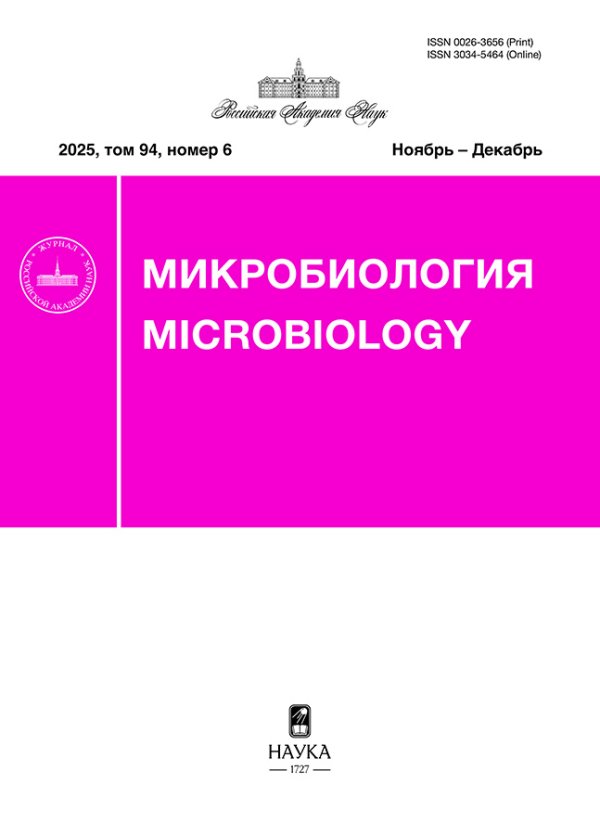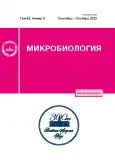Polylactide Degradation in the Presence of Members of the Genus Bacillus
- Authors: Mironov V.V.1, Trofimchuk E.S.2, Ostrikova V.V.1, Plutalova A.V.2, Moskvina M.A.2, Shchelushkina .A.1, Chernikova E.V.2, Sokolova D.S.1
-
Affiliations:
- Winogradsky Institute of Microbiology, Federal Research Center of Biotechnology, Russian Academy of Sciences
- Department of Chemistry, Moscow State University
- Issue: Vol 92, No 5 (2023)
- Pages: 527-532
- Section: SHORT COMMUNICATIONS
- URL: https://journals.rcsi.science/0026-3656/article/view/140513
- DOI: https://doi.org/10.31857/S0026365623600207
- EDN: https://elibrary.ru/QOBSIK
- ID: 140513
Cite item
Full Text
Abstract
Abstract—
Microorganisms of the genus Bacillus were shown to have different effects on the degradation of polylactide packaging material. The degradation experiment was carried out on an agar medium at a temperature of 55°C and pH 5.9 for 14 days. This is the first report on the abiotic hydrolysis significantly slowing down during incubation with B. licheniformis S8 and occurring in parallel with the main process, enzymatic hydrolysis. The latter involved sequential cleavage of monomer units from the end of the macromolecule and the formation of low molecular weight products used by microorganisms as a substrate; it contributed to a decrease in the mass of polylactide by 5.1%, while maintaining its molecular weight and decreasing the dispersion of molecular weights. In the presence of bacteria B. amyloliquefaciens, B. subtilis subsp. spizizenii, and B. subtilis subsp. inaquosorum, the polymer weight did not decrease, but the molecular weight decreased significantly, similar to abiotic hydrolysis.
About the authors
V. V. Mironov
Winogradsky Institute of Microbiology, Federal Research Center of Biotechnology, Russian Academy of Sciences
Author for correspondence.
Email: 7390530@gmail.com
Russia, 119071, Moscow
E. S. Trofimchuk
Department of Chemistry, Moscow State University
Email: 7390530@gmail.com
Russia, 119991, Moscow
V. V. Ostrikova
Winogradsky Institute of Microbiology, Federal Research Center of Biotechnology, Russian Academy of Sciences
Email: 7390530@gmail.com
Russia, 119071, Moscow
A. V. Plutalova
Department of Chemistry, Moscow State University
Email: 7390530@gmail.com
Russia, 119991, Moscow
M. A. Moskvina
Department of Chemistry, Moscow State University
Email: 7390530@gmail.com
Russia, 119991, Moscow
A. A. Shchelushkina
Winogradsky Institute of Microbiology, Federal Research Center of Biotechnology, Russian Academy of Sciences
Email: 7390530@gmail.com
Russia, 119071, Moscow
E. V. Chernikova
Department of Chemistry, Moscow State University
Email: 7390530@gmail.com
Russia, 119991, Moscow
D. S. Sokolova
Winogradsky Institute of Microbiology, Federal Research Center of Biotechnology, Russian Academy of Sciences
Email: 7390530@gmail.com
Russia, 119071, Moscow
References
- Миронов В.В., Трофимчук Е.С., Загустина Н.А., Иванова О.А., Вантеева А.В., Бочкова Е.А., Острикова В.В., Чжан Ш. Твердофазная биодеградация полилактида (обзор) // Прикл. биохимия и микробиология. 2022. Т. 58. С. 537‒550.
- Mironov V.V., Trofimchuk E.S., Zagustina N.A., Ivanova O.A., Vanteeva A.V., Bochkova E.A., Ostrikova V.V., Zhang S. Solid-phase biodegradation of polylactide (review) // Appl. Biochem. Microbiol. 2022. V. 58. P. 537‒550.
- Соколова Д.Ш. Образование биоэмульгаторов и поверхностно-активных веществ галотолерантными и термотолерантными штаммами Bacillus licheniformis S10 и S8 // Материалы Cедьмого московского межд. конгресса “Биотехнология: состояние и перспективы развития”. Москва. 19–22.03.2013. Ч. 2. С. 206.
- Belbella A., Vauthier Ch., Fessi H., Devissaguet J.-Ph., Puisieux F. In vitro degradation of nanospheres from poly(D,L-lactides) of different molecular weights and polydispersities // Int. J. Pharmaceut. 1996. V. 129. P. 95‒102.
- Mironov V., Vanteeva A., Sokolova D., Merkel A., Nikolaev Y. Microbiota dynamics of mechanically separated organic fraction of municipal solid waste during composting // Microorganisms. 2021a. V. 9. Art. 1877.
- Mironov V., Vanteeva A., Merkel A. Microbiological activity during co-composting of food and agricultural waste for soil amendment // Agronomy. 2021b. V. 11. Art. 928.
- De Jong S., Arias E., Rijkers D., van Nostrum C., Bosch J.K.-V.D., Hennink W. New insights into the hydrolytic degradation of poly(lactic acid): Participation of the alcohol terminus // Polymer. 2001. V. 42. P. 2795–2802.
- Hosni A.S., Pittman J.K., Robson G.D. Microbial degradation of four biodegradable polymers in soil and compost demonstrating polycaprolactone as an ideal compostable plastic // Waste Manag. 2019. V. 97. P. 105–114.
- Husárová L., Pekărová S., Stloukal P., Kucharzcy P., Verney V., Commereuc S., Ramone A., Koutny M. Identification of important abiotic and biotic factors in the biodegradation of poly(l-lactic acid) // Int. J. Biol. Macromol. 2014. V. 71. P. 155–162.
- Ivleva N.P. Chemical analysis of microplastics and nanoplastics: challenges, advanced methods, and perspectives // Chem. Rev. 2021. V. 121. P. 11886–11936.
- Kale G., Auras R., Singh S.P. Comparison of the degradability of poly(lactide) packages in composting and ambient exposure conditions // Packag. Technol. Sci. 2007. V. 20. P. 49–70.
- Karamanlioglu M., Preziosi R., Robson G.D. Abiotic and biotic environmental degradation of the bioplastic polymer poly(lactic acid): a review // Polym. Degrad. Stab. 2017. V. 137. P. 122–130.
- Lee S.H., Yeo S.Y. Improvement of hydrophilicity of polylactic acid (PLA) fabrics by means of a proteolytic enzyme from Bacillus licheniformis // Fibers and Polymers. 2016. V. 17. P. 1154‒1161.
- Mitchell M.K., Hirt D.E. Degradation of PLA fibers at elevated temperature and humidity // Polym. Eng. Sci. 2015. V. 55. P. 1652–1660.
- Prema S., Uma Maheswari Devi Palempalli. Degradation of polylactide film by depolymerase from Bacillus amyloliquefaciens // Int. J. Sci. Engin. Res. 2014. V. 5. P. 520–525.
- Prema S., Uma Maheswari Devi Palempalli. Degradation of polylactide plastic by PLA depolymerase isolated from thermophilic Bacillus // Int. J. Curr. Microbiol. App. Sci. 2015. V. 4. P. 645–654.
- Pantani R., De Santis F., Auriemma F., De Rosa C., Di Girolamo R. Effects of water sorption on poly(lactic acid) // Polymer. 2016. V. 99. P. 130–139.
- Richert A., Dąbrowska G.B. Enzymatic degradation and biofilm formation during biodegradation of polylactide and polycaprolactone polymers in various environments // Int. J. Biol. Macromol. 2021. V. 176. P. 226–232.
- Schliecker G., Schmidt C., Fuchs S., Kissel T. Characterization of a homologous series of d,l-lactic acid oligomers; a mechanistic study on the degradation kinetics in vitro // Biomaterials. 2003. V. 24. P. 3835–3844.
- Stepczyńska M., Rytlewski P. Enzymatic degradation of flax-fibers reinforced polylactide // Int. Biodeterior. Biodegr. 2016. V. 126. P. 160–166.
- Yuan J., Ma J., Sun Y., Zhou T., Zhao Y., Yu F. Microbial degradation and other environmental aspects of microplastics/plastics // Sci. Total Environ. 2020. V. 715. Art. 136968.
- Zaaba N.F., Jaafar M. A review on degradation mechanisms of polylactic acid: hydrolytic, photodegradative, microbial, and enzymatic degradation // Polym. Eng. Sci. 2020. V. 60. P. 2061–2075.
Supplementary files











